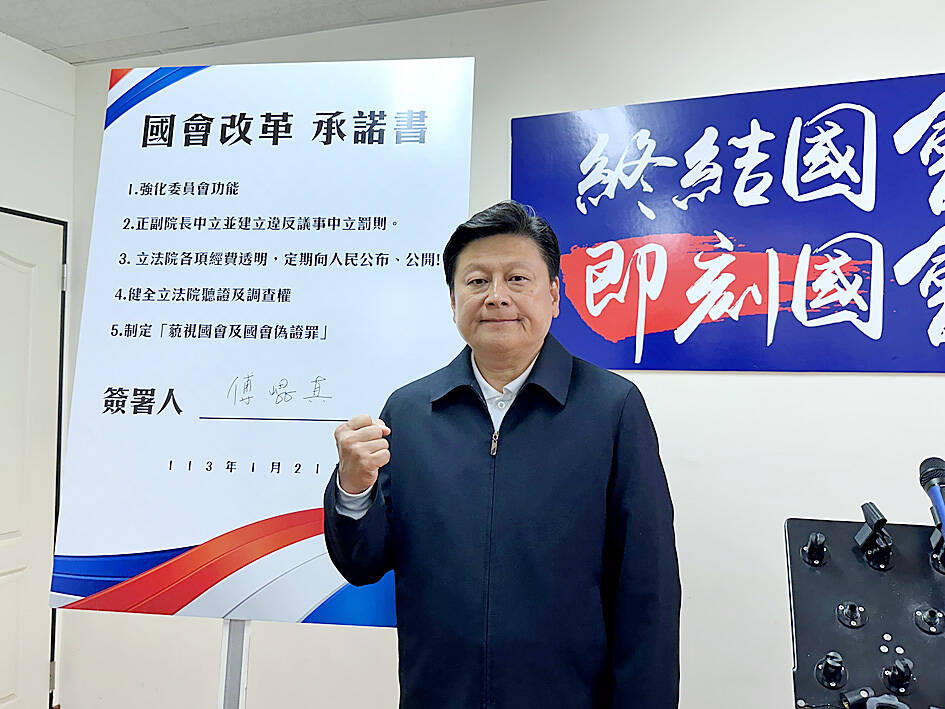Chinese Nationalist Party (KMT) legislator-elect Fu Kun-chi yesterday reiterated his intention to run for legislative speaker.
At a press conference in Hualien County’s Jian Township (吉安) yesterday, Fu outlined his platform based on various reforms, including enhancing functions of legislative committees, transparency in operating budgets and for legislators to be given the power to issue subpoenas in conducting investigations.
The announcement by Fu, a former Hualien County commissioner, runs counter to his party, as KMT Chairman Eric Chu (朱立倫) has already given backing to KMT nominees Han Kuo-yu (韓國瑜) and Johnny Chiang (江啟臣) to run for legislative speaker and deputy speaker positions respectively.

At a banquet last night, Han called for party unity and asked for support for his run for the speakership.
Voting is scheduled for Feb. 1, the first day of the new legislature.
In the Jan. 13 legislative elections, the Democratic Progressive Party (DPP) secured 51 seats in the 113-seat legislature, the KMT 52 and the Taiwan People’s Party eight. Another two seats were won by independents aligned with the KMT.
Meanwhile, Legislative Speaker You Si-kun of the DPP, in an effort to retain his speaker’s position, extolled his forging of new relations with foreign countries’ parliaments.
He said yesterday that the speaker plays a vital role in Taiwan’s diplomatic relations, but if the new speaker has a pro-China stance and has personal links to Beijing, then it would be difficult for the legislature to engage properly in foreign affairs.
Separately, DPP Hualien County Councilor Hu Jen-shun (胡仁順) yesterday criticized Fu, saying he “should try to reform himself first.”
Hu said that when Fu was a county commissioner and faced criticism from county councilors over his policies, Fu would use government resources and media to conduct smear campaigns and freeze project funds that were requested by councilors for local constituencies.
Additional reporting by Wang Chin-yi and Chiang Chih-hsiung

The manufacture of the remaining 28 M1A2T Abrams tanks Taiwan purchased from the US has recently been completed, and they are expected to be delivered within the next one to two months, a source said yesterday. The Ministry of National Defense is arranging cargo ships to transport the tanks to Taiwan as soon as possible, said the source, who is familiar with the matter. The estimated arrival time ranges from late this month to early next month, the source said. The 28 Abrams tanks make up the third and final batch of a total of 108 tanks, valued at about NT$40.5 billion

Two Taiwanese prosecutors were questioned by Chinese security personnel at their hotel during a trip to China’s Henan Province this month, the Mainland Affairs Council (MAC) said yesterday. The officers had personal information on the prosecutors, including “when they were assigned to their posts, their work locations and job titles,” MAC Deputy Minister and spokesman Liang Wen-chieh (梁文傑) said. On top of asking about their agencies and positions, the officers also questioned the prosecutors about the Cross-Strait Joint Crime-Fighting and Judicial Mutual Assistance Agreement, a pact that serves as the framework for Taiwan-China cooperation on combating crime and providing judicial assistance, Liang

A group from the Taiwanese Designers in Australia association yesterday represented Taiwan at the Midsumma Pride March in Melbourne. The march, held in the St. Kilda suburb, is the city’s largest LGBTQIA+ parade and the flagship event of the annual Midsumma Festival. It attracted more than 45,000 spectators who supported the 400 groups and 10,000 marchers that participated this year, the association said. Taiwanese Designers said they organized a team to march for Taiwan this year, joining politicians, government agencies, professionals and community organizations in showing support for LGBTQIA+ people and diverse communities. As the first country in Asia to legalize same-sex

MOTIVES QUESTIONED The PLA considers Xi’s policies toward Taiwan to be driven by personal considerations rather than military assessment, the Epoch Times reports Chinese President Xi Jinping’s (習近平) latest purge of the Chinese People’s Liberation Army (PLA) leadership might have been prompted by the military’s opposition to plans of invading Taiwan, the Epoch Times said. The Chinese military opposes waging war against Taiwan by a large consensus, putting it at odds with Xi’s vision, the Falun Gong-affiliated daily said in a report on Thursday, citing anonymous sources with insight into the PLA’s inner workings. The opposition is not the opinion of a few generals, but a widely shared view among the PLA cadre, the Epoch Times cited them as saying. “Chinese forces know full well that